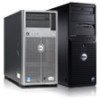Dell PowerEdge R420 Technical Guide - Page 28
Thermal and acoustics, Thermal design
 |
View all Dell PowerEdge R420 manuals
Add to My Manuals
Save this manual to your list of manuals |
Page 28 highlights
Figure 7 shows a 550W power supply unit extended from the R420 chassis. Figure 7. 550W power supply unit The PowerEdge R420 supports up to two AC PSUs with 1 + 1 redundancy, auto- sensing, and auto- switching capability. The 350W redundant PSU (1 or 1 + 1) is recommended for a one- processor configuration; the 350W PSU in a two- processor configuration may not provide sufficient power, which may impact system performance. To support the Intel turbo boost feature (default enabled in BIOS), a system with 95W processors (8- core or 6- core) and a 550W non- redundant PSU may not sufficiently support feature rich configurations. Using a 550W hot- plug redundant PSU for feature rich configurations is recommended. To verify this and other possible system configurations, use the Dell Energy Smart Solution Advisor at Dell.com/ESSA. Dell PSUs have achieved Platinum efficiency levels as shown in Table 17. Table 17. Power supply efficiency Form factor Redundant Non-redundant Output 350W AC 550W AC 550W AC Class Platinum Platinum Silver 10% 82.0% 82.0% N/A Efficiency targets by load 20% 90.0% 90.0% 85.0% 50% 94.0% 94.0% 88.0% 100% 91.0% 91.0% 85.0% Thermal and acoustics Optimized thermal management makes the PowerEdge R420 cool and quiet. Benefiting from smart cooling fan speed control, the R420 can keep both high performance and good acoustics across a wide range of ambient temperatures from 10°C to 35°C (50°F to 95°F) and to extended ambient temperature ranges (see Table 26). Operating environments for the R420 can vary from the data center to general- use spaces. In a typical configuration, the R420 is suitable for an open office environment. Thermal design The thermal design of the PowerEdge R420 reflects the following: • Multiple sensors are monitored for thermal feedback control: The PowerEdge R420 dynamically controls system cooling fan speed based on responses from component 28 PowerEdge R420 Technical Guide















